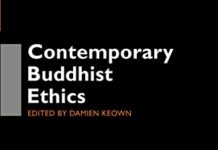
Ebook Info
- Published: 1996
- Number of pages: 168 pages
- Format: EPUB
- File Size: 5.52 MB
- Authors: Damien Keown
Description
This Very Short Introduction introduces the reader to the teachings of the Buddha and to the integration of Buddhism into daily life. What are the distinctive features of Buddhism? Who was the Buddha, and what are his teachings? How has Buddhist thought developed over the centuries, and how can contemporary dilemmas be faced from a Buddhist perspective? Words such as ‘karma’ and ‘nirvana’ have entered our vocabulary, but what do they mean? Damien Keown’s book provides a lively,informative response to these frequently asked questions about Buddhism.
User’s Reviews
Reviews from Amazon users which were colected at the time this book was published on the website:
⭐This whole series of books does the job for me hundred 150 pages get you the basic information about the topic this book series does not disappoint
⭐Part of a series by Oxford University Press, this book, ‘Buddhism: A Very Short Introduction’, follows the same format as other texts in the Very Short Introduction series — it has fewer than 150 pages, is well indexed, has a useful glossary, accessible and enjoyable narrative, and captures the essence in a very short space the major points of its topic. There are probably nearing 100 volumes in this Very Short Introduction series (making it, ironically, not a Very Short series), but among those that I have read, this text stands out as being one of the best.Damien Keown, of the University of London and the Royal Asiatic Society, addresses Buddhism past and present, East and West. Beginning with narrative tales the help to exhibit the principles, Keown examines in turn the major questions. First, with regard to Buddhism, is this — is Buddhism really a religion? Often categorised as such, it is often the exception proving the rule. Many take strong spiritual and philosophical ideas from Buddhism (sometimes without knowing it) but do not subscribe the larger system of practices — but perhaps most telling, Buddhism is a non-theistic way of being. Keown looks at seven dimensions of religion, and concludes that Buddhism does fit a broader definition of religion.Keown proceeds from there to look at the origins of Buddhism, the life of the Buddha, ideas of karma and reincarnation, and the central ideas of the Four Noble Truths in Buddhism. From these beginnings, Buddhism branches out, the largest grouping being the Mahayana (who get their own chapter), and other spreading first across Asia and then to the rest of the world.Like other books in this Very Short series, there are useful maps, a nice snapshot timeline, and suggestions for further reading, should the Very Short introduction not prove sufficient (and for many, this sample will leave the reader wanting more). I cannot speak too highly of this series, and of this volume on Buddhism by Keown in particular.
⭐There are many introductory texts available on Buddhism, but this is by far the best I have come across. Its great strength is its scope. Other books that I have read on the subject present some or other particular variety of Buddhism, usually a Westernized version of Zen. As Keown states on page 1, “Students of Buddhism have tended to fasten onto a small part of the tradition and assume their conclusions held true about the whole”. He illustrates this with the story of the blind men and the elephant (from a Buddhist scripture called the Udana) in which each man grasps a part of the elephant – tail, trunk, tusk, etc – and bases his description of the animal on that part alone. Keown attempts a broad overview of the history, development and fragmentation of Buddhist thought, from the life of the Buddha to the present day.It is what it says – only a very short introduction – but it is packed with useful information. Keown writes well, in a lucid, concise style.A different edition of the same book is also available in the A Brief Insight series, available here on Amazon. The text in that series is (so far as I can tell) always the same as in the VSI series, but the print is larger and there are many more illustrations, some in color. You might want to check that out if you intend to read this book, which you should.[PeterReeve]
⭐The Very Short Introduction series includes some very useful books. I had therefore expected an objective, balanced look at the history, development, beliefs, and practices of Buddhism.What I got instead was a tract of the sort that the Jehovah’s Witnesses or the Scientologists might hand out. In it, everything about Buddhism is true and good — in fact it is, repeatedly, “brilliant” and “glorious.” The first chapter labors at length to argue that Buddhism really is a religion, a pointless exercise except for someone trying to sell it as such. The next few demonstrate that the philosophy’s major tenets now differ, sometimes radically, from those espoused by the Buddha — with no mention of what that does to the idea that Buddhism is a religion. The difference between Buddhism’s two major branches is, we’re told, is just like the difference between Catholicism and Protestantism (is it? arguably not, but to know that you’d have to do what I did — after reading this book find several other sources that provide more than a zealot’s view); there are many Christian analogies, which would be an understandable pedagogical device were it not so often used to suggest Buddhism’s superiority. The details of the Buddha’s life — as accepted by Buddhists — are presented without qualification even though all we know historically is that he probably existed. (This includes the supposed fact that he abandoned his wife and child not long after his son’s birth, which the book mentions and then praises.) Meditation is not merely described but presented with a straight face as a path to enlightenment. The book goes out of its way to proclaim Buddhism’s exquisite sensitivity to politically-correct causes of the moment — race, gender, diversity — even though that requires a lengthy argument about why Buddhism’s attitude toward them isn’t ambivalent at best and antithetical at worst, despite almost everything the book has said about it to that point .If you yearn to believe then this book will help you along the way. Otherwise, this is the sort of proselytizing literature you would refuse to accept on a sidewalk or in an airport and would pick off your windshield and throw away if you found it placed there. To learn objectively about Buddhism Wikipedia is actually not a bad starting point; this book is.
⭐The Oxford ‘Very Short Introduction’ series is a consistently high-quality offering, of which I possess several items. This introduction to Buddhism is no exception, covering the many aspects of the philisophy/faith in an easily essimilated form for those curious to explore the bases of this belief system.
⭐This book is a life saver to any student studying Buddhism, seriously. It helped me out so much while reasearching and writing up my Buddhism essay, and it clearly explains the difference between the two schools of thought as well as giving a good introduction to many other aspects of this complex and interesting religion.
⭐Some mistake in the accuracy of language especially when he is talking about Oriental.But I think this is the best introduction in English.
⭐Inspiring read, interested to find out much more! Plenty of food for thought, particularly in the field of Buddhism in the West.
⭐A superb introduction to Buddhism. I bought this book for set reading to an OU course and found it informative, easy to read and non biased. A well written little book covering a big topic!
Keywords
Free Download Buddhism: A Very Short Introduction (Very Short Introductions Book 3) in EPUB format
Buddhism: A Very Short Introduction (Very Short Introductions Book 3) EPUB Free Download
Download Buddhism: A Very Short Introduction (Very Short Introductions Book 3) 1996 EPUB Free
Buddhism: A Very Short Introduction (Very Short Introductions Book 3) 1996 EPUB Free Download
Download Buddhism: A Very Short Introduction (Very Short Introductions Book 3) EPUB
Free Download Ebook Buddhism: A Very Short Introduction (Very Short Introductions Book 3)


